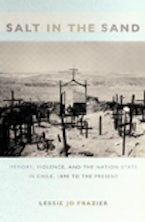“A path-breaking study of history and memory in Chile’s legendary nitrate north that ties together the massacres of miners in the early twentieth century and the human rights abuses of the Pinochet era. A highly original contribution to memory studies, gender studies, and Chilean history.”-Peter Winn, editor of Victims of the Chilean Miracle: Workers and Neoliberalism in the Pinochet Era, 1973–2002
“The hot winds of the Atacama desert in northern Chile have not succeeded in erasing what has become the territory of Lessie Jo Frazier’s Salt in the Sand, a book centered on the meanings of the deep memories of repression, massacres, and executions that contributed to the formation of Chilean popular identity. Well written and theoretically and historically original, Salt in the Sand reveals the continuous dialogue between events and subjectivities throughout the Chilean twentieth century.”-Francisco Zapata, El Colegio de MÉxico
“The modern Chilean state has been linked to violence since its inception, despite official historiography’s assertion that the 1973 coup and the Pinochet regime that followed were ‘aberrations’ in an otherwise democratic order favoring peace. Lessie Jo Frazier illuminates the competing uses of the past across cultural, racial, and class lines. Through her brilliant analysis of memory as a dynamic category employed by clashing collectivities, Frazier demonstrates how the use of memory in post-dictatorial regimes is not in and of itself liberating or new, but rather modeled on previous historical instances of remembering and forgetting.”-Licia Fiol-Matta, author of A Queer Mother for the Nation: The State and Gabriela Mistral
“This is a welcome and serious substantiation of the significance of emotion, soul, and heart that constitutes popular identification with, or rejection of, or outcry against the state.”
- Katherine Hite (Latin American Politics and Society)

